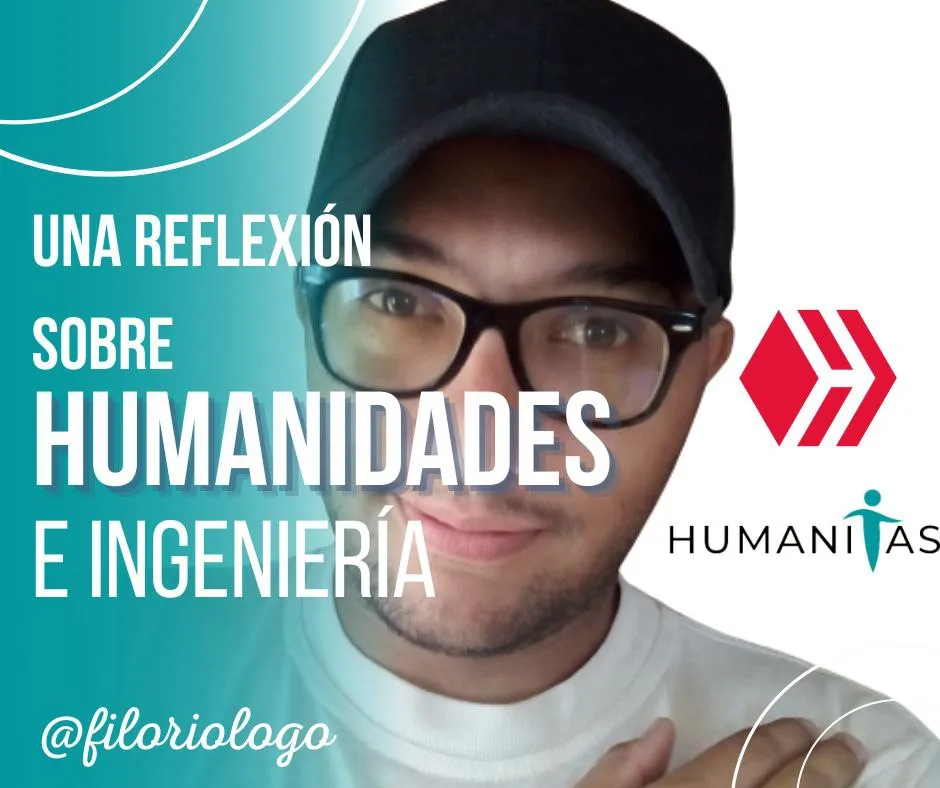
Throughout time, academia has been dedicated to specialize more and more knowledge, making disciplines sectorized and each time it is an extremely specialized area. This makes humanistic disciplines go one way and scientific disciplines another, and in large universities we see how there are buildings or deanships dedicated to science and, on the other hand, there are deanships only for humanities. I think that this partialization of knowledge has caused the illusion that these areas of knowledge walk separately.
Far from it, both science and humanities walk on the same path, the difference is not their object of study, but the way of looking at reality, which separately are only partialities of reality, but when we try to unify the perspectives we realize that they walk in harmony.
In this opportunity I want to outline a reflection that harmonizes scientific and humanistic knowledge, taking advantage of this community proposal. If you haven't heard about it, just click here and get involved. In short it is nothing more than outlining your perspective, your opinion about the relationship of engineering and human development and aesthetics.
The most important philosopher of the 20th century (at least he is for me), Martin Heidegger stated that "Science does not think", but, far from wanting to promote some outrage from the devotees of science, what Heidegger tried to do was to outline a point of view that at least I find interesting. It is that, strictly speaking, the task of thinking requires leisure and careful reflection, and it is not that science lacks these attributes, but its nature to inquire, to seek, to test, to try, to experiment and to experiment. Science is restless, thinking a bit calmer. But, this does not make them go their separate ways, since both currents try to promote human development.
In the times of the Platonic academy they were not differentiated knowledge, the humanistic and the scientific were given in the same environment, today it seems that we point again to that trend of unifying careers. I think we need more holistic knowledge. Technological progress in recent decades has been by leaps and bounds, and I believe that reflective thinking such as ethics has tried to keep pace admirably. Engineering in recent years has developed technologies that a few decades ago were unthinkable. This makes us contemplate the enormous creative capacity that we human beings have, and that we have an ability to solve problems like no other being, but at the same time that we solve some, we create others, and this has happened because there has not been a holistic training, although there are also other factors this lack of unifying the sciences and humanities are an aspect to consider.
We are creating ethical problems in the technological field because we do not stop to think with humanistic criteria. In this case, Heidegger was right, "science does not think", making the unification of knowledge imperative. Perhaps, think of new university careers such as computer engineering and bioethics. Philosophy and design engineering. Although it is a matter for another reflection, it is no secret that academia needs to be restructured.
All knowledge is in context, it is in relation to other knowledge. There is no isolated knowledge. It is a matter of creating interdisciplinary disciplines in order to reflect society and create new, more human technologies. I liked to try to outline my point of view on how humanities and engineering go hand in hand, well sciences in general, engineering is nothing more than applied science to try to solve problems and improve life and its conditions in its multiple fields.

VERSIÓN EN ESPAÑOL
Humanidades e ingeniería
La academia a lo largo del tiempo se ha dedicado a especializar cada vez más los conocimientos, haciendo que se sectoricen las disciplinas y cada vez sea un área extremadamente especializada. Haciendo que disciplinas humanísticas vayan por un camino y las científicas por otro, y en grandes universidades vemos como hay edificios o decanatos dedicados a la ciencia y, por otro lado, hay decanatos únicamente para humanidades. Pienso que esta parcialización del saber a causado la ilusión de que estas áreas del saber caminan por separado.
Lejos de ser así, tanto la ciencia como las humanidades caminan en un mismo sendero, la diferencia no es su objeto de estudio, sino el modo de mirar la realidad, que de manera separada son solo parcialidades de la realidad, pero cuando intentamos unificar las perspectivas nos damos cuenta de que se camina en armonía.
En esta oportunidad quiero esbozar una reflexión que armonice los saberes científicos y humanísticos, aprovechando esta propuesta de la comunidad. Si no te has enterado de qué va, solo pincha aquí y anímate a participar. En resumen no es otra cosa que esbozar tu perspectiva, tu opinión acerca de la relación de la ingeniería y el desarrollo humano y la estética.
El filósofo más importante del siglo XX (por lo menos lo es para mí), Martin Heidegger afirmó que “La ciencia no piensa”, pero, lejos de querer promover algún escándalo por parte de los devotos de la ciencia, lo que intentó Heidegger fue esbozar un punto de vista que por lo menos a mí me parece interesante. Es que, en sentido estricto, la tarea de pensar requiere ocio y reflexión detenida, y no es que la ciencia carezca de estos atributos, sino que su naturaleza de indagar, buscar, probar, experimentar y experimentar. La ciencia es inquieta, el pensar un poco más calmado. Pero, esto no los hace andar por caminos separados, ya que ambas corrientes intentan promover un desarrollo humano.
En los tiempos de la academia platónica no eran saberes diferenciados, lo humanístico y lo científico se daba en un mismo ambiente, hoy en día parece que apuntáramos de nuevo a esa tendencia de unificar carreras. Creo que necesitamos saberes más holísticos. El avance tecnológico de estas últimas décadas ha sido a pasos agigantados, y creo que pensamientos reflexivos como la ética ha intentado seguir el paso de manera admirable. La ingeniería de los últimos años ha desarrollado tecnologías que unas décadas atrás era cosa impensable. Eso nos hace contemplar la enorme capacidad creativa que tenemos los seres humanos, y que tenemos una habilidad para resolver problemas como ningún otro ser, pero a la vez que solucionamos unos, creamos otros, y eso ha sucedido porque no ha habido una formación holística, aunque hay también otros factores esta falta de unificar las ciencias y las humanidades son un aspecto a considerar.
Estamos creando problemas éticos en el ámbito tecnológico porque no nos detenemos a pensar con criterios humanísticos. En este caso, Heidegger tenía razón, “la ciencia no piensa”, haciendo imperativo la unificación de saberes. Quizá, pensar en nuevas carreras universitarias tipo Ingeniería informática y bioética. Filosofía e Ingeniería de diseño. Aunque es asunto de otra reflexión, pero, para nadie, es un secreto que, la academia necesita ser reestructurada.
Todo saber es en contexto, es en relación con otros saberes. No hay saber aislado. Se trata de crear disciplinas interdisciplinares con el fin de además reflexionar la sociedad, se creen nuevas tecnologías más humanas. Me gustó intentar esbozar mi punto de vista sobre como las humanidades y la ingeniería van de la mano, bueno las ciencias en general, las ingenierías no son más que ciencia aplicada para intentar resolver problemas y mejorar la vida y las condiciones de esta en sus múltiples ámbitos.
Invito a participar en esta iniciativa a mis amigos @jkalthor y @neoculto

